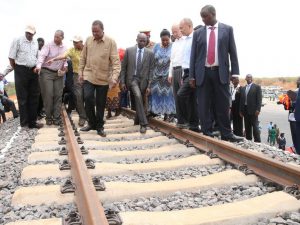
President Kenyatta inspecting a stretch of the rail line with his key aides… recently
Two key public figures have been arrested by Kenyan authorities on suspicion of corruption over allocation of land for the East African country’s new $3 billion flagship Nairobi-Mombasa railway.
Chairman of Kenyan National Land Commission, Mohammed Abdalla Swazuri, was one of 18 officials, businesspeople and companies named in a statement announcing the arrests. Managing Director of the Kenya Railways Corporation, Atanas Kariuki Maina, was also arrested.
The rail line connecting Nairobi, the country’s capital, with East Africa’s main port was funded by China and is one of the biggest infrastructure projects of President Uhuru Kenyatta, whose government this year embarked on an anti-corruption drive.
Opposition leaders and Kenyan economists have criticized the railway’s funding for increasing the country’s debt burden, which the IMF estimated at between 54-55 per cent of economic output (GDP) in the 2017-18 fiscal year.
The investigation that led to the arrests of the officials centers on allegations that officials siphoned taxpayer money through bogus compensation claims for land used for the railway, a statement from Kenya’s anti-corruption agency, said. But, the statement did not spell out who made the allegations.
Analysts and businesspeople say Kenya, East Africa’s richest economy per capita, loses a significant percentage of its annual GDP to corruption and it is hard to do business without paying bribes.
Public prosecutor Noordin Mohamed Haji ordered the arrests of the officials and said in the statement he was preparing to charge them to court.
Kenya, last year, inaugurated the multibillion railway project. No Chinese companies or individuals were named in the prosecutor’s statement.
Kenya has been hit this year by a spate of scandals related to the alleged theft of hundreds of millions of Kenyan shillings (millions of dollars) by officials from government bodies.
Haji, appointed by Kenyatta earlier this year, is bringing charges against dozens of state officials and businesspeople in a number of court cases that have not yet begun.


